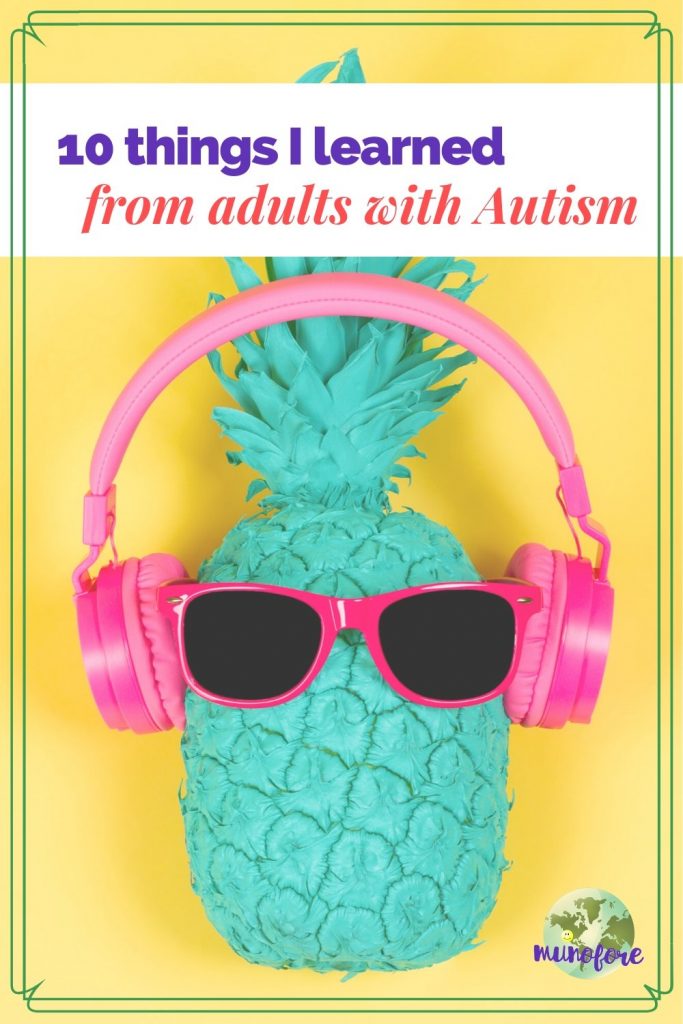Listening to adults with Autism is the best way to understand how they perceive and deal with the world around them. We can learn about their challenges, hopes, and goals. By doing so we are better able to include them as an integral part of our society.

Many times in a special needs community, others speak for the individuals. If you want to know what it is like living with Autism in society today, who better to ask than someone living with Autism?
I am not going to waste space defining or describing Autism. If you need more information you can read more at the Autism Society site.
My son is a middle schooler with Autism. I rarely post about how Autism effects my family on the blog. But, I recently attended a panel discussion by six adults with Autism discussing how it impacts their life and I wanted to share with those that could not attend.
This post is a bit of a brain dump of a three hour discussion. I promise I won't be offended you don't want to read the entire thing, and choose to skip to the final takeaways.
The Panel
There were six adults on the panel. They are in no way indicative of the entire community of adults with Autism. We like to say, if you know one person with Autism, you know one person with Autism. However, there are many commonalities.
Some items of interest about the panel:
- 3 males and 3 females
- 5 verbal, 1 non verbal that spoke with a communication device
- age range 25 - 35
- of the 5 verbal adults, the age range of learning to speak was 4-8 years old
- at least 2 live independently (they are roommates), 3 live with their parents and I don't remember the 6th mentioning it
- 1 has an Associates degree and was going back to school for a different degree, 1 has a BA, and 3 others were in college.
- 1 mentioned she has her driver's license a few mentioned car pools.
- all of the verbal adults have jobs; a few are under employed at the moment and are working to change that with continuing education and job searches/interviews.
On the Spectrum, Autistic or with Autism?
So what is the preferred way of referring to a person with Autism Spectrum Disorder? The topic never came up.
This could be something the general population worries about more than they do. It could be that they felt they had more important issues to discuss with us. The literature promoting the event and the panel all said "with Autism" so that's what I am going with here.
But, that might not be what every individual prefers. When in doubt, listen to the term the person uses or ask what they prefer.
Disability versus Difference

All 6 panelists said Autism was a disability for them in some ways, but wanted others to view it as a difference.
They all feel the disability aspect when it comes to communicating with others. Reading emotions, understanding sarcasm and metaphors, knowing when others are joking and knowing what to say and do to start and carry on a conversation are things they all struggle with today.
They all want to be treated as just someone with a difference. They also all emphasized the following:
DO NOT BABY THEM! Talk to them like you would anyone else, even if they are non-verbal or don't appear to be paying attention.
Do not talk down to them as if they were a child. Ask questions directly of them and not anyone with them.
Look at them, but understand they may not be able to look at you.
I have lost count of the number of times I have been asked "does he want" or "does he like" with my son standing right next to me. Doctors and nurses, who should know better, used to do it with my Mom too when she broke her hip. ASK THEM DIRECTLY!!!! This is so rude to do to anyone with a perceived disability. If they cannot answer you directly you will figure it out in a few seconds, but at least show them them respect to talk directly to them first.
The Impact of Sensory Processing
It was only in 2013 that sensory processing issues was added to the list of symptoms to diagnose Autism. But those living with Autism can tell you it has a huge impact on their lives.
I have been told this video helps us "normal" people get a better understanding of the daily sensory overload many feel.
One woman gave the following analogy: Imagine you are at an all day rock concert, with the noise and lights and people. Afterwards you are probably exhausted and need downtime from all of the stimulation. Many people with Autism feel this way just going through daily life, sometimes all of that input gets to be too much and their brain is overwhelmed and shuts down.
On the other end of the spectrum some are hypo-sensitive and do not feel things that "normal" people do. She likened it to when you have a shot of Novocaine and poke your face because you can't feel it. Which explains why sometimes they feel the need to hit or hurt themselves.
Have you ever seen light streaming through a window and noticed the dust? A few mentioned they can see light waves like that all the time!
Smells can overwhelm and trigger them. One mentioned she hid under the desk when the teacher's perfume was too strong, but she didn't have the words to express her distress. The teacher just assumed she didn't want to do her work.
High pitched noises and minor keys were both mentioned as sounds that caused a fight or flight reaction.
Why did it take the American Psychiatrists so long to formally recognize this aspect of Autism? When I think back on my son's meltdowns and bad days, most were probably due to sensory overload and lack of sleep (which was probably due to sensory overload). We often feel compelled to leave places early to avoid a potential meltdown due to over-stimulation.
The Nemesis that is Communication

Obviously the woman who was non-verbal had communication issues. She had pre-typed the answers to the questions before to speed things up. Her responses were quite eloquent! She almost brought me to tears a few times. Her inability to speak does not mean she is stupid or doesn't have her own thoughts, wishes and desires.
In the Q&A session her mother told the story of the first time she got the communicator (a keyboard with oversized keys and an iPad to speak the words). The first thing she said was she wanted her own pizza. Her brother had his own piece, but mom was sharing a piece with her.
Besides having difficulty translating facial expression and vocal intonation into emotions, others conversation challenges were mentioned.
Some had trouble knowing how to initiate and continue a conversation even though they wanted to.
Some couldn't come up with the correct words so their brains repeated something they had heard before. And repeated it. And repeated it. How often do babies and toddlers repeat themselves when learning to speak? That is how the brain learns.
Eye contact can be extremely difficult. One panelist said "eyes are the scariest part of the human body." Don't be fooled though, just because they may not appear to be looking at you it doesn't mean they are not paying attention or do not understand.
My son can look people in the eye but often needs reminders to do so. He will randomly walk up to people and start talking about Pokemon and then just walk away. He will say "Hi, what's your name?" even if he already knows the individual or the person has just said their name.
Interests and Obsessions

People with Autism can be very passionate about a favorite subject to the point of obsessions: cars, history and geography, baseball, video games. It is a way for their minds to create order.
Oftentimes children and teens can be interested in shows and activities that are created for younger ages. Their brains weren't ready to handle them at the intended age. One example given was wanting to play tag in middle school. Her brain and body weren't ready for it at elementary age but were at 13, but by then it was "inappropriate behavior".
The irony of perception of propriety was brought up. The popular kid can wear a Teenage Mutant Ninja Turtle t-shirt or carry a My Little Pony back pack in high school and it is considered stylish, but if a teen with Autism does, it is babyish.
Routine and order are critically important. Disruption to their routine can be very disconcerting and hard to overcome.
Oy! If my son does not have his ID card, school bracelet and watch his entire day can be ruined. Even though he doesn't really need them to function throughout the day, not having them disrupts his entire sense of order.
If you ask him about Pokemon right now he can probably name all 807! Trivia: the creator of Pokemon has Autism.
Friendships and School

The panel all felt alienated at school (my word not theirs). Other students did not understand or accept their differences. If they were lucky they were ignored. One was bullied relentlessly and was told by adults to just ignore it.
One said he didn't know if the other kids were making fun of him or not because he couldn't understand the social cues. He usually preferred staying to the edges of the playground at recess because the noise and activity was chaotic and overwhelming to him.
One mentioned having a friend in high school that helped teach her how to have a conversation and they were still best friends today.
Most of the panel have friends now as adults, including each other. A few date, and one even had a girlfriend until they broke up recently.
My son is so blessed to have been placed in the perfect kindergarten class with kids who all accepted him and look out for him to this day. That may be due in small part to a conscious effort by my husband and me to make sure he attends their games and plays and talks with them afterwards. But I think it is just that those kids and their parents are awesome. And hopefully that Autism is becoming less "scary" to those that don't deal with it on a daily basis.
Let them Stim and Repeat!

Stimming behaviors such as hand flapping, spinning, rocking, etc. may seem odd to many of us when observed, but they are coping mechanisms for those with Autism. They help them focus and handle all of the sensory information around them.
One found a discreet way to stim by clenching his fingers together under the table, which he admitted he had been doing all afternoon.
All agreed that while stimming may be distracting to others, it is important for the individual to continue otherwise overload could be imminent.
If they are trying to tell you something and constantly repeating, let them get it out. Especially if they seem anxious. Sort of like talking about a bad dream to make it go away.
My son talks non-stop and repeats himself when he is anxious. For the 5 minutes between agreeing to have a shot and the nurse bringing it in he asked us repeatedly how big the needle was, how many were there, where it was going to go, etc. We'd answer, he'd ask again.
How Parents Can Help ... and Hurt
Some had strained relationships with their parents who felt they did not understand and support them. One feels his parents are continually lecturing him and refuse to see things from his point of view and never apologize to him.
One woman mentioned her mother told her that morning her 3 inch platform heels were not appropriate to wear to the panel. (This mom thought they were very stylish, and was a bit envious she can't wear shoes like that anymore without her ankles hurting).
One suggested introducing new things (foods, situations, ideas) gradually and repeatedly. Sometimes it is the newness that is off-putting.
Another explained his parents found volunteer opportunities for him in high school to help him learn to socialize.
My Takeaways
Here are the main ideas about treating individuals with Autism that I took away from this panel discussion.
- Treat them as an individual whose brain may function differently than yours. Nothing more nothing less.
- Do not talk down to them as if they are incapable of understanding. Talk directly to them in an age appropriate tone.
- If you want to have a conversation with them, find out their interest and discuss that.
- You may need to initiate conversation or be accepting if they repeatedly ask your name or say hi. Their brain is struggling to find the right words.
- Understand they may not look you in the eye or be able to understand social cues or figurative language.
- Their senses may easily become overwhelmed. Sights, sounds, smells and touch may either be blown out of proportion in their brains. Or they may not perceive these stimuli.
- Obsessions, structure and order are one way they make sense of their world.
- Ignore stimming behaviors, recognize that it may mean they are anxious. Let them finish stories even if it is just repeating phrases over and over.
- Be patient and accepting.
- They have a lot to offer our society if society will give them a chance.
It is vital that we let the voices of those with Autism self advocate. Take the time to get to know individuals with Autism in your life by treating them just as you would anyone else, but with a bit more patience and understanding for their differences. They want to belong. They want to contribute. Take the time to listen.

















Leave a Reply